Find dy/dx y=e^x y = ex y = e x Differentiate both sides of the equation d dx (y) = d dx (ex) d d x ( y) = d d x ( e x) The derivative of y y with respect to x x is y' y ′ y' y ′ Differentiate using the Exponential Rule which states that d dx ax d d x a x is axln(a) a x ln ( a) where a a = e e ex e x Click here 👆 to get an answer to your question ️ If y=cos{log(x^n)}, find dy/dx 1 Log in Join now 1 Log in Join now Ask your question Ask your question shreyasraj735 shreyasraj735 Math Secondary School 5 pts Answered If y=cos{log(x^n)}, find dy/dx 1 See answer shreyasraj735 is waiting for your help Add your answer and earn points 0 votes 219k views asked in Mathematics by Rubby01 (501k points) If y = cos1 (e x), find dy/dx class12;
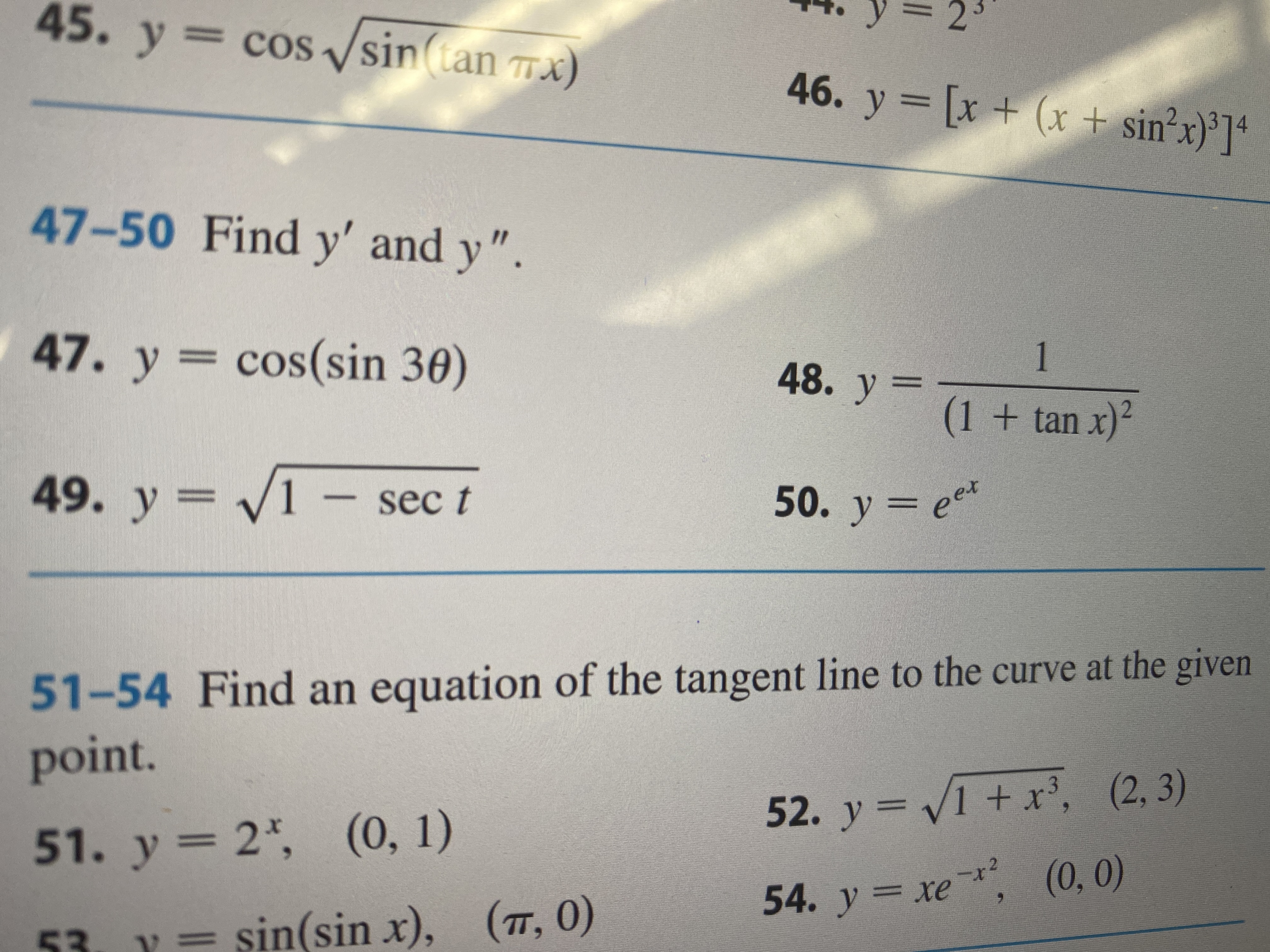
Answered 45 Y Cos Sin Tan X 46 Y X X Bartleby
Find dy/dx if y=cos(log x e^x) x 0
Find dy/dx if y=cos(log x e^x) x 0-Uploaded By CaptainPorpoiseMaster170 Pages 154 This preview shows page 128 133 out of 154 pages 1) y = sin (e x log x) 2) (x 2 5) e –2x sin x 3) y = (x cos x) 3 4) 1– cosx y log 1 cosx = 5Solve your math problems using our free math solver with stepbystep solutions Our math solver supports basic math, prealgebra, algebra, trigonometry, calculus and more




If Y Cos 1 1 X 1 X Then Find Dy Dx Youtube
Stack Exchange network consists of 177 Q&A communities including Stack Overflow, the largest, most trusted online community for developers to learn, share their knowledge, and build their careers Visit Stack ExchangeAnswer to If e^{x y} log xy xy = 0, then find dy/dx By signing up, you'll get thousands of stepbystep solutions to your homeworkQuestion Double integral of cos (y^2) dy dx, Where y=1 , y=x, x=0, x=1 are the bounds Related Answer More Related Question & AnswersMore Related Question & Answers
Prove that y = a cos (log x) b sin (log x) is the solution of x 2 (d 2 y/dx 2) x(dy/dx) y = 0Share It On Facebook Twitter Email 1 Answer 1 vote answered by Pankaj01 (503k points) selected by Rubby01 Best answer y = cos1 (e x) (diff wrt x) ← Prev Question Next Question → No related questions foundContact us on below numbers For Study plan details / 1000 AM to 700 PM IST all days Franchisee/Partner Enquiry (South)
𝑑𝑦/𝑑𝑥 𝑑𝑦/𝑑𝑥 log co𝑠𝑥𝑥 tan 𝑑𝑦/𝑑𝑥 = log co𝑠𝑦 𝑦 tan𝑥 𝑑𝑦/𝑑𝑥 (log co𝑠𝑥𝑥 tan 𝑦) = log co𝑠𝑦 𝑦 tan𝑥 𝒅𝒚/𝒅𝒙 = (𝐥𝐨𝐠 𝒄𝒐𝒔𝒚 " " 𝒚 𝒕𝒂𝒏𝒙)/(𝐥𝐨𝐠 𝒄𝒐𝒔𝒙 𝒙 𝐭𝐚𝐧 𝒚) Get an answer for 'Q If `y =` `log{tan(pi/4 x/2)}` , show that `dy/dx` `sec x` = 0' and find homework help for other Math questions at eNotesDy/ydx = log2 (2cosx × sinx) 0 (because log2 is constant) dy/dX = (sin2x × log2)/y Put the value of y dy/dX = (sin2x× log2)/ (2^2cos square x)



Is X 2 D 2y Dx 2 3x Dy Dx 5y X 2 Sin Log X Quora




Ipe Material Notes
Let y = log (cos e x) By using the chain rule, we obtain `"dy"/"dx" = "d"/"dx" "log" (cos"e"^"x")` `= 1/cos"e"^"x" "d"/"dx" (cos"e"^"x")` ` = 1/ (cos"e"^"x") (sin"e"^"x") "d"/"dx" ("e"^"x")` ` = (sin"e"^"x")/ (cos"e"^"x") "e"^"x"` `= "e"^"x" tan"e"^"x", "e"^"x" ≠ (2"n"1)pi/2, "n"∈ "N"`About Press Copyright Contact us Creators Advertise Developers Terms Privacy Policy & Safety How works Test new features Press Copyright Contact us CreatorsFind dy/dx if y=( cos (sin x) ) Class 12 Maths Solution Share 125 40 (1 ratings) Download App for Answer Let ( y=cos (sin x) ) ( therefore frac{d y}{d x}=frac{d}{d x} cos (sin x)=sin (sin x) frac{d}{d x} sin x ) begin{aligned} therefore &leftbecause frac{d}{d x} cos f(x)=sin f(x) frac{d}{d x} f(x)right &=sin (sin x) cdot cos x=cos x sin (sin x) end{aligned} 125 40 (1 ratings




Pdf Engineering Mathematics Ii 15mat21 Surya Karthik Academia Edu




Ipe Material Notes
If y = f(x), the differential may also be written as dy Since dx(x, in which the vector ε → 0 as Δx → 0, then f is by definition differentiable at the point x The matrix A is sometimes known as the Jacobian matrix, and the linear transformation that associates to the increment Δx ∈ R n the vector AΔx ∈ R m is, in this general setting, known as the differential df(x) of f at0 ppremium935 ppremium935 Math Secondary School answered 14 Find dy dx if y= cos(log xe^x), x > 0 1 See answer ppremium935 is waiting for your help Add your answer and earn pointsY Cos X Log X Find Dy Dx Scholr For more information and source, see on this link https//wwwscholrcom/community/question/ycosxlogxfinddydx//




Ex 5 4 9 Differentiate Cos X Log X Chapter 5 Ncert




Find Dy Dx If Y E A X Secx Logx Sqrt 1 2x
Finddydxif y= cos(log xe^x), x >So, by the chain rule dy/dx = (dy/du) * (du/dx) = y * ln (x)1) So dy/dx = ln (x)1 * x^x Next, let y# = x^x^x, which by convention is equal to x^ (x^x) not (x^x)^x) That is, exponentiation is carried out from right to left, not left to right, the opposite forY = cos(log x) find dy by dx Answers 3 Show answers Another question on Math Math, 0600 Evaluate square root96* sqroot24sqroot242* sqroot578 Cevap 2 Show answer Math, 0700 In a group of 100 uber driver partners, 72 people can speak hindi and 43 can speak english assuming each can speak at least one of these languages how many




Rd Sharma Class 12 Maths Solutions Chapter 11 Differentiation
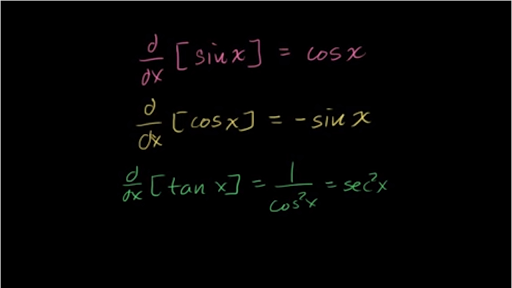



Derivatives Of Sin X Cos X Tan X Eˣ Ln X Video Khan Academy
if x cosy y cosx 1then find the value of dy dx Mathematics TopperLearningcom 9qo6ekrr Starting early can help you score better!In calculus, Leibniz's notation, named in honor of the 17thcentury German philosopher and mathematician Gottfried Wilhelm Leibniz, uses the symbols dx and dy to represent infinitely small (or infinitesimal) increments of x and y, respectively, just as Δx and Δy represent finite increments of x and y, respectively Consider y as a function of a variable x, or y = f(x)If Sin(xy)=Log(xy) then find dy/dx 1 Thank you for registering One of our academic counsellors will contact you within 1 working day




Implicit And Logarithmic Differentiation




Derivatives Of Sin X Cos X Tan X Eˣ Ln X Video Khan Academy
You need to find an integrating factor, such that your equation becomes exact More specifically $$(x\sin(y)y\cos(y))dx(x\cos(y)y\sin(y))dy=0 $$Dy/dx = 2 log x log 2 ×(1/x) dy/dx = (2 log x log 2)/x Hence option (4) is the answer Was this answer helpful?X Y E X Y So Prove That Dy Dx Logx 1 Logx 2 Youtube For more information and source, see on this link https//wwwyoutubecom/watch?v=ILLEg9pcCbA
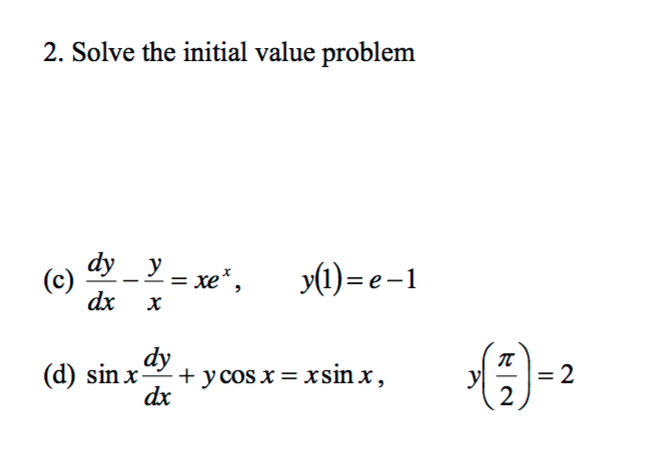



Solve The Initial Value Problem Dy Dx Y X Xe X Chegg Com




The Solution Of The De X Cos Y Dy X E X Log X E X D
Answer to Let y = cos x a) Find the differential dy b) Evaluate dy if x = pi / 3 and dx = 005 By signing up, you'll get thousands of1find dy/dx when sinh 3y=cos 2x 2calculate dy/dx if Ln(xy)=e^x/y 3calculate dy/dx when xy^3y=3x 4calculate dy/dx when y^2=(3x 1)^3/9x 2 5when dy/dx =(x 6)^1/2 6find the area lying above the xaxis and below the parabolic curve y=4x x^2 16Evaluate cot 2x dx 17Evaluate sin 4xcos2 4x dx 18Evaluate e3x dx 19Evaluate cos2 5x dx Evaluate 3x^2cos(2x34) dx 21Evaluate dxCourse Title AC MISC;



2



Solve The Following Differential Equation X Cos Y Dy Xex Log X Ex Dx Mathematics Topperlearning Com Rn73oni66
Let's simplify it First dy/dx = (y/x 1)/(y/x 1) Taking y = vx dy/dx = v xdv/dx Therefore, dx/x = (v 1)dv / (v^2 1) Integrating we get log (1/x) logc = arctan (y/x) 1/2 log1 y sin e x log x 2 x 2 5 e 2x sin x 3 y x cos x3 4 1 cosxy log 1 cosx 5 3 3 1 1 y sin e x log x 2 x 2 5 e 2x sin x 3 y x cos x3 4 1 School Open University of Mauritius;Answer 1 on a question If x^y = e^x – y, prove that dy/dx = log x/(1 log x)^2 the answers to smartanswersincom



What Is The Solution Of X D 3xd 1 Y Sin Log X Quora




Find Dy Dx When Y Cosx Logx Youtube
By rearranging the give differential equation we get , dx/dy =1/y x/ (ylogy) dx/dy x/ (ylogy) =1/y Now, calculate the integrating factor (IF), e ∫1/ (ylogy) =IF Taking, logy=t (say) differentiating on both sides we get, dy=ydt IF=e ∫dt/t =e logt =t, where t=logy now,Avail 25% off on study pack Avail Offer × Contact Us Contact Need assistance?Get RD Sharma Volume 1 Solutions for Class 12 Chapter Differentiation here BeTrainedin has solved each questions of RD Sharma Volume 1 very thoroughly to help the students in solving any question from the book with a team of well experianced subject matter experts Practice Differentiation questions and become a master of concepts All solutions are explained using



The Solution Of Dy Dx X Log X 2 X Sin Y Y Cos Y Is Sarthaks Econnect Largest Online Education Community




Implicit And Logarithmic Differentiation
What is the lewis structure for co2?What is the lewis structure for hcn?SolutionShow Solution Let y = (log x) x x log x Also, let u = (log x) x and v = x log x `⇒"dy"/"dx" = "du"/"dx""dv"/"dx"` (1) Differentiating both sides with respect to x, we obtain `1/"u" "du"/"dx" ="d"/"dx" ("x") xx log (log"x")"x""d"/"dx" log (log"x")`




Tutorial 1 Man002 Rates Equations




Find Dy Dx If X Cos Log T And Y Log Cos T
Given that y = log(sinx), we need to find the value of dxdy We know that the derivative of log(x) wrt x is x1 dxdy = dxd (log(sinx)) = sinx1 × dxd (sinx) = sinx1 ×cosx= cotxHence, dxdy = cotx Ex 54, 10 Differentiate wrt 𝑥 in, cos (log𝑥 𝑒^𝑥), 𝑥 > 0Let 𝑦 = cos (log𝑥 𝑒^𝑥 ) Differentiating both sides 𝑤𝑟𝑡𝑥 𝑦^′ = (cos (log𝑥 𝑒^𝑥 ) )^′ 𝑦^′= 〖−sin 〗 (log𝑥𝑒^𝑥 ) (log𝑥 𝑒^𝑥 )^′ 𝑦^′= 〖−sin 〗 (log𝑥𝑒^𝑥 ) ( (log𝑥 )^′ (𝑒^𝑥 )^′ ) 𝑦^′ = 〖− sin 〗 (log𝑥𝑒^𝑥 ) (1/𝑥 𝑒^𝑥 ) 𝒚^′ = −Question 1 Solve (e^2yy) cos x dy/dx=e^y sin 2x, y(0)=0 Question 2 Solve dy/dxy=f(x),given y(0) = 0 and f(x) = {1 0 x > 1} Question 3 The differential equation dP/dt = (k cos t) P where k is a positive constant is a model of human population P(t) of a certain community Discuss an interpretation of the solution of this equation In other




Ex 5 3 11 Find Dy Dx In Y Cos 1 1 X2 1 X2 Ex 5 3



If Y Sin Log X Then Prove That X 2 D 2y Dx 2 Dy Dx Y 0 Sarthaks Econnect Largest Online Education Community
0 (0) Upvote (0) Choose An Option That Best Describes Your Problem Answer not in Detail Incomplete Answer Answer Incorrect Others Answer not in Detail Incomplete Answer Answer Incorrect Others Thank you Your Feedback will Help us Serve you better Related Asked by Topperlearning User 4th Jun, 14, 0123 PM Expert Answer x cos y dy = (xex log x ex) dx Integrating both sides, we have This is the required solution of the given differential equationWe have, y = xxTaking log on both the sides, we getlogy = xlogxOn differentiating wrt x, we gety1 dxdy = xx logx⇒ dxdy = y ylogx⇒ dxdy = xx(1logx) (∵ y = xx)




Derivative Of Logarithmic Function Step By Step Explanation Calculus Youtube




Worked Example Differentiating Related Functions Video Khan Academy
Find #dy/dx#of #y=x^logx (log x)^x#?Calculus 1 Answer Epsilon Explanation please see the image file to explanation Answer link Related questions How do I determine the molecular shape of a molecule?Use implicit differentiation to find the points where the parabola defined by x^{2}2xyy^{2}6x2y17 = 0 has horizontal and vertical tangent lines List your answers as points in the form (a,b) Math Compare the graphs of the logarithmic functions f(x)= log(7)x and g(x) = log(4)x For what values of x is f=g, f>g, and fg, but what is f




Find The Derivatives W R T X X Sec X Log X E X




If Y X 2 Cos Log X Then Find Dy Dx Youtube
Y = d d x ( sin x × log e x) In this differentiation problem, the variable y represents a function in x Hence, it can be differentiated with respect to x and do not think that y is a constant Therefore, the function y can be differentiated by the derivative rule of logarithms 1 y × d y d x = d d x ( sin12 Nimi Binha, added an answer, on 15/4/19 Nimi Binha answered this Find dy by dx if logx by ex View Full Answer Diya K D, added an answer, on 1/7/18 Diya K D answered this Hope it will help you Was this answer helpful?




Maths Pages 51 100 Flip Pdf Download Fliphtml5



Cos X Log X X 2 E X Sarthaks Econnect Largest Online Education Community
Find dy/dx y = natural log of cos(x) Differentiate both sides of the equation The derivative of with respect to is Differentiate the right side of the equation Tap for more steps Differentiate using the chain rule, which states that is where and Tap for more steps To apply the Chain Rule, set as The derivative of with respect to is Replace all occurrences of with Convert from To find dy / dx of y = cos x x Just do the same cos x x = e x ln(cos(x))Or, you can do it a bit differently y = cos x x Take the logarithm of both sides gives ln y = x ln(cos x) Then you can differentiate both sides with respect to x, and see what you get `dy/dx=1/(xy log10)cdot(yx cdot dy/dx)` In the line above we have applied the chain rule because `log(xy)` is a composite function On top



1



2



If X Ecos2t And Y Esin2t Prove That Dy Dy Y Log X Log Y Studyrankersonline




Differentiate The Following W R T X Cos Log X Ex X 0 Mathematics Shaalaa Com
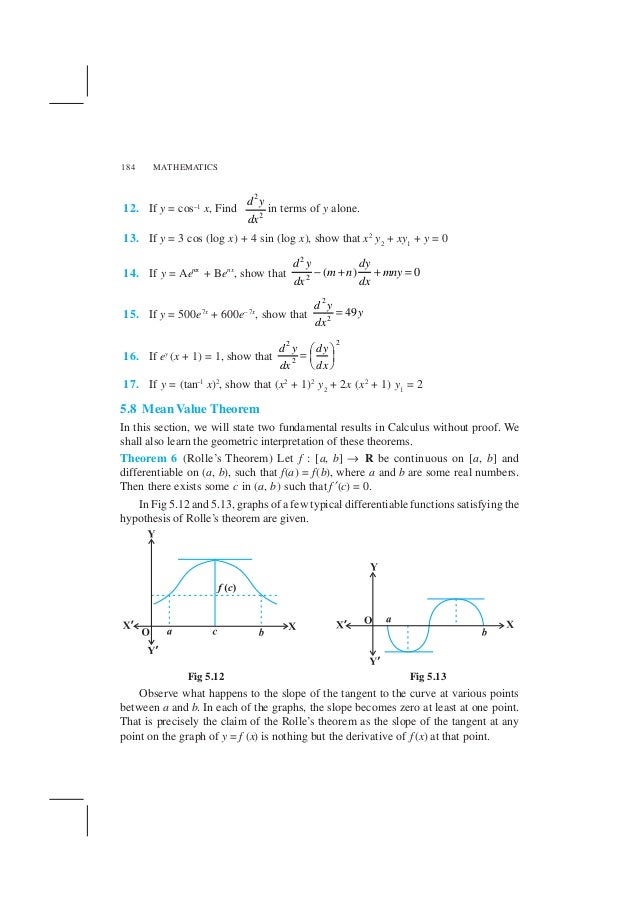



Lemh105



2




If Y Log 1 Cos2 X 1 E2x 1 2 Show That Dy Dx E2x 1 E2x Sin X Cos X 1 Cos2 X Show Each And Every Step Mathematics Topperlearning Com Idjkxezz




Find Derivative Of Cos Logx E X X 0 W R T To X



1




Answered 45 Y Cos Sin Tan X 46 Y X X Bartleby




Integration By Parts 𝑒ˣ Cos X Dx Video Khan Academy



2




Implicit And Logarithmic Differentiation



2




If Y Cos 1 1 X 1 X Then Find Dy Dx Youtube




The Derivative Of X 2 1 Log X E X Cos X W R T X Is




Lambert W Function Wikipedia




If X Cos Logt Y Log Cost Then Dy Dx Youtube



2
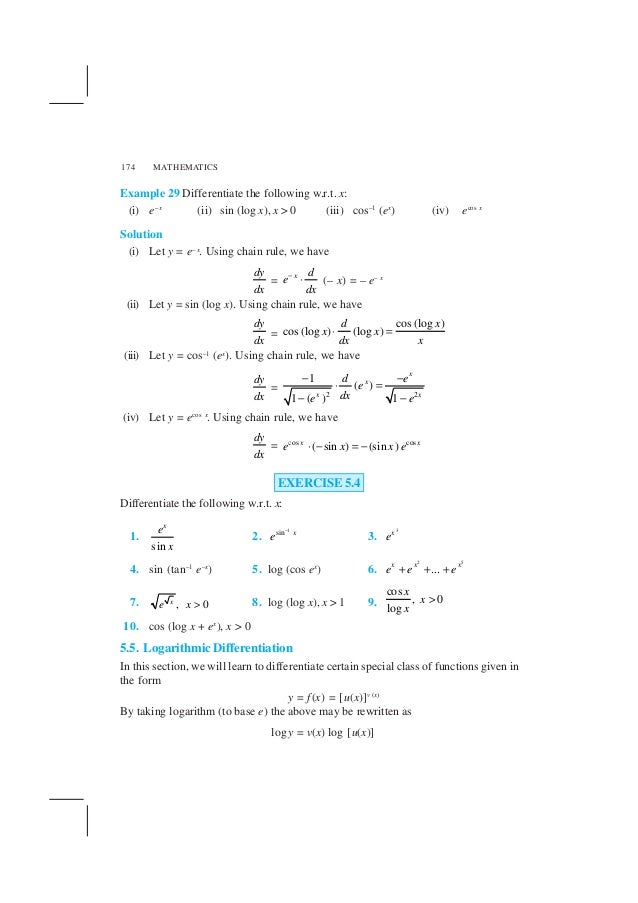



Lemh105




Ex 5 5 3 Differentiate The Function Log X Cos X Teachoo




Find Dy Dx If E X Y Cos X Y Brainly In




If F X Cos Logx Then F X F Y 1 2 F X Y F Xy Youtube




Derivatives Of Exponential Logarithmic Functions




Find The Derivative Of Yw R T X Where Y Log Cosx X E X 2




Particular Integral Of X 2 Y Xy 4y Cos Ln X X Cdot Sin Ln X Mathematics Stack Exchange



If X A Cos 8 Log Tan 8 2 And Y A Sin 8 Then What Is Dy Dx At 8 P 4 Quora




Show That Y A Cos Log X B Sin Log X Is A Solution Of The Differential Equation X 2 D 2y Youtube
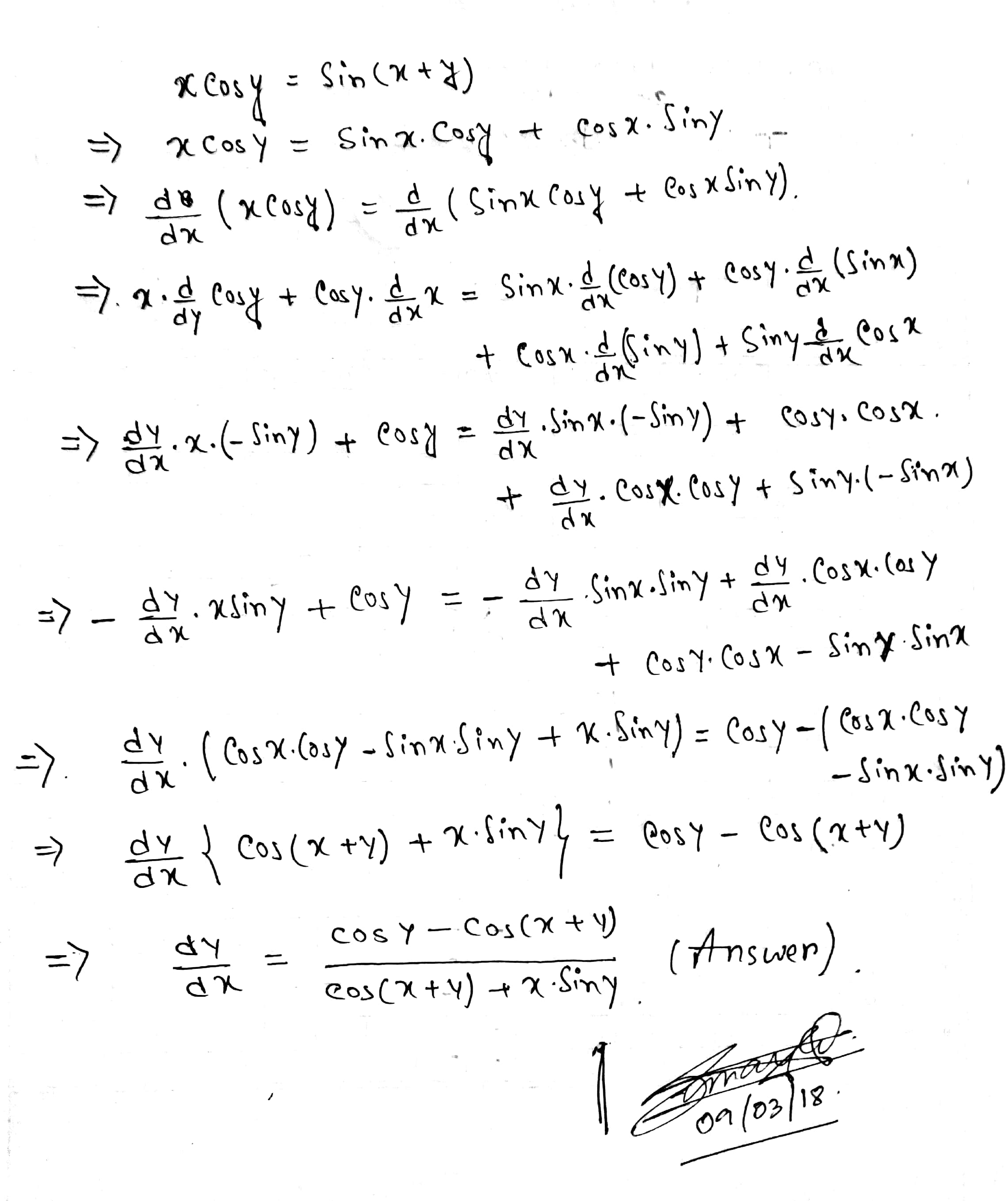



Find Dy Dx Of X Cos Y Sin X Y Socratic



Q Tbn And9gcsi1dl Wf0pxul2szqux2n C1u1tgvwggnmyohkuihna07xnnmk Usqp Cau




If Y Logx Sin X Then Dy Dx




If Y Sinx Cosx Sinx Cosx Then Dy Dx At X 0 Is Equal To Youtube



2




If Y Cos Log X Then D 2 Y Dx 2



If X Y E X Y Show That Dy Dx Logx Log Xe 2 Sarthaks Econnect Largest Online Education Community




Implicit Differentiation Advanced Example Video Khan Academy




Exact Differential Equation Tan X Sin X Sin Y Dx Cos X Cos Y Dy 0 Youtube




Worked Example Differentiating Related Functions Video Khan Academy




If Cos X Y Cos Y X Find Dydx
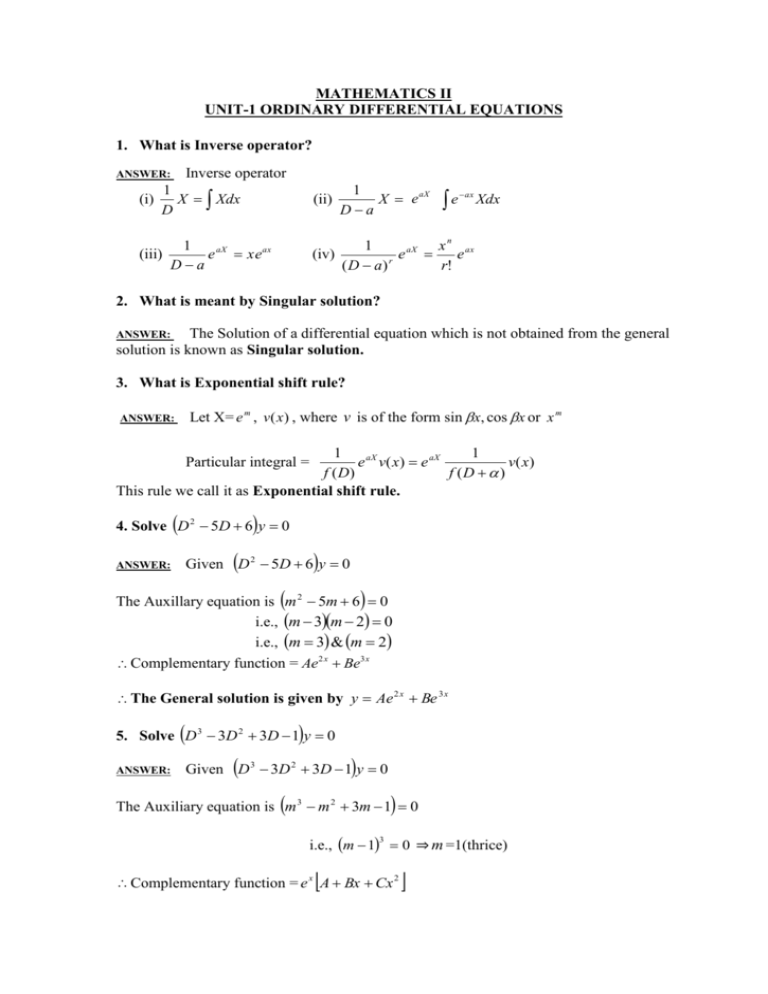



Mathematics Ii Tranquileducation



How To Solve Math X 3d 3 3x 2d 2 Xd 1 Y Cos Log X Math Quora




If Y Log 1 Cos 2 X1 E 2x Show That Dydx E 2x 1 E 2x Sinxcosx 1 Cos 2 X




If Y Cos Log Cot X Then Find Frac D Y D X




Solve The Following Differential Equation Xcosydy Xe Xlogx E X Dx




Ex 5 5 3 Differentiate The Function Log X Cos X Teachoo




Show That Y A Cos Log X B Sin Log X Is A Solution Of The Diffe




If Y A Cos Log X Sin Log X Then X 2y2 Xy1




Evaluate Dydx Xe X Logx E Xx Cos Y




Ex 5 2 8 Differentiate Cos Root X With Respect To X




Ex 5 7 10 Find Second Order Derivatives Of Sin Log X
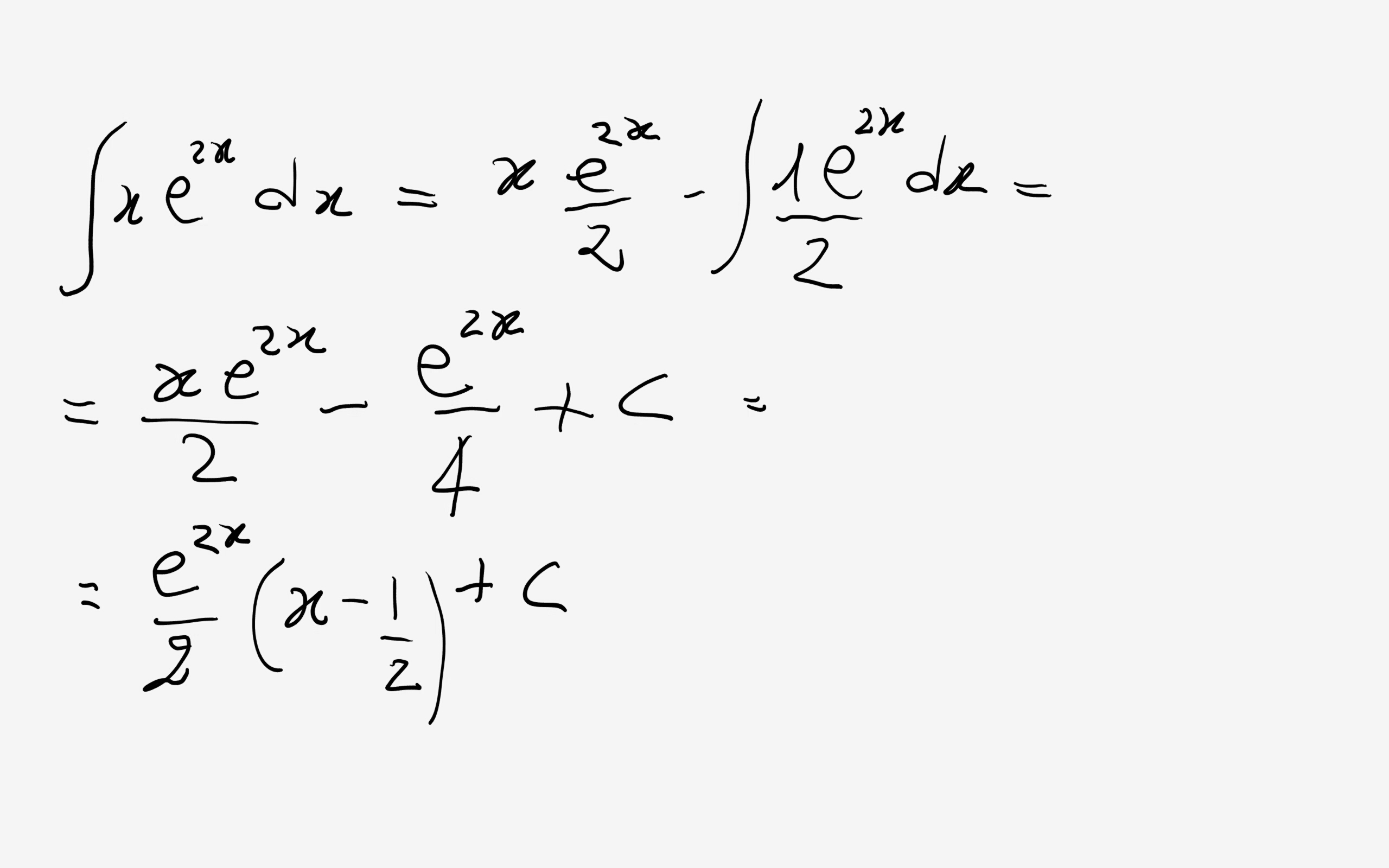



How Do You Integrate Xe 2x Dx Socratic



2



2




यद Y Cos Log X त Dy Dx Youtube



Solve The Differential Equations D 2y Dx 2 2dy Dx Y Xe X Cos X Sarthaks Econnect Largest Online Education Community



If F X Cos Log X Then F 1 X F 1 X 1 2 F X Y F Xy Is Equal To Sarthaks Econnect Largest Online Education Community




Y Cos X Log X Find Dy Dx Scholr



How To Solve Math X 3d 3 3x 2d 2 Xd 1 Y Cos Log X Math Quora




Ipe Material Notes



If Y A Cos Log X B Sin Log X Then How Do You Prove That X D Y Dx Dy Dx Y 0 Quora



How To Solve Math X 3d 3 3x 2d 2 Xd 1 Y Cos Log X Math Quora



What Is The Solution Of X D 3xd 1 Y Sin Log X Quora




Example 29 Differentiate I E X Ii Sin Log X Iii Cos 1 E X




Ex 5 4 10 Differentiate W R T X In Cos Log X E X Teachoo




Example 29 Differentiate I E X Ii Sin Log X Iii Cos 1 E X



2



What Is The Derivative Of Y Cos X Cos X Quora



What Is The Bisection Method Where F X Cosx X E X Quora



1




Show That Y A Cos Log X B Sin Log X Is A Solution Of The Diffe




If Y Sin X Log X Then Dy Dx




Derivatives Of Exponential Logarithmic Functions




If Y Ex Cosx Prove That Dy Dx 2 1 2 Ex Cos X Pi 4 Maths Meritnation Com



2




Ipe Material Notes




Derivative Rules For Y Cos X And Y Tan X Calculus Socratic



0 件のコメント:
コメントを投稿